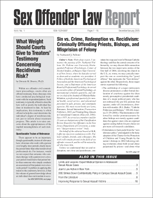Incompetent to Proceed and Sexual Offender Civil Commitment
Author: Robin J. Wilson, Ph.D., ABPP.; Carrole DePass, Psy.D..; Tiesha Nelson, Psy.D..
Source: Volume 12, Number 05, August/September 2011 , pp.67-72(6)

< previous article |next article > |return to table of contents
Abstract:
Twenty states and the federal government currently have statutes allowing for the indefinite, involuntary commitment of sexual offenders who meet certain criteria, and other states continue to consider enacting similar legislation. Sexual offender civil commitment (SOCC) is predicated on the idea that certain offenders pose such an inordinate and unmanageable risk to the community that they must be preventively detained while they attend treatment designed to address identified criminogenic needs and risk factors. This article focuses on a unique and specific subset of those held in SOCC treatment facilities, specifically, those with medical, psychiatric, or other symptoms that render them incompetent to stand trial (IST) in their civil commitment proceedings. This subpopulation presents a unique array of challenges for legal and mental health practitioners, not only due to their complex and multifaceted treatment needs, but also considering that the civil nature of their pending commitment differentiates them from the more typical IST cases carried out in the context of criminal proceedings. This article addresses the legal, policy, and clinical issues associated with competency to stand trial and sexual offender civil commitment, focusing on the competency restoration program offered at the Florida Civil Commitment Center.Keywords: sexually violent predators; imcompetent to stand trial
Affiliations:
1: Florida Civil Commitment Center; 2: Florida Civil Commitment Center; 3: Florida Civil Commitment Center.